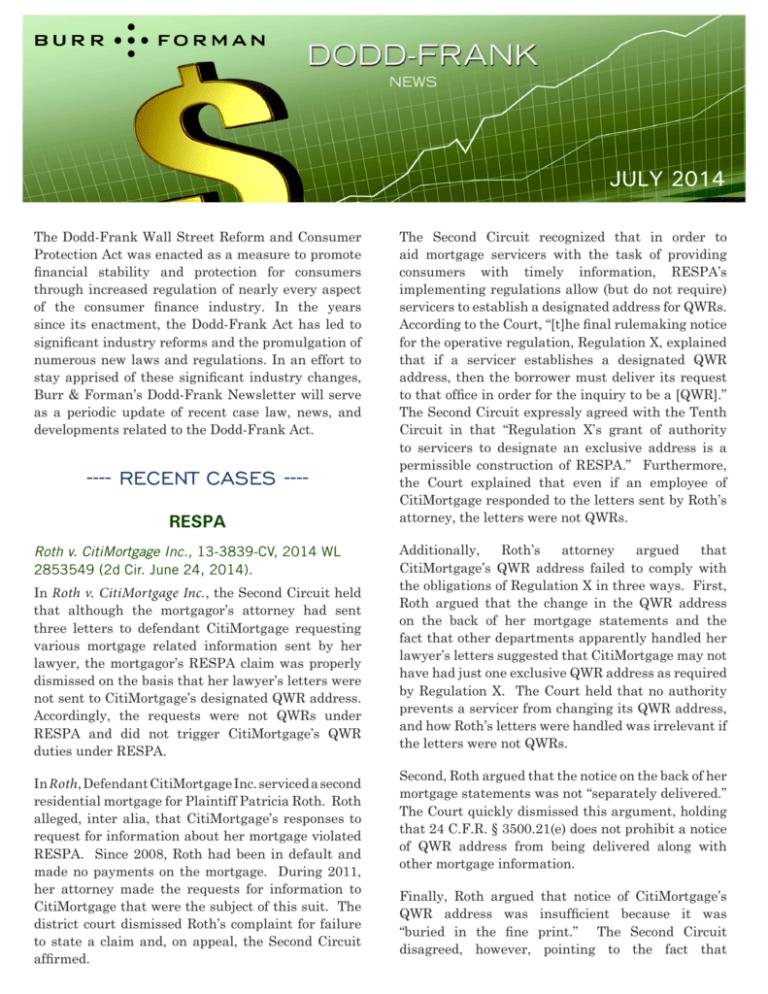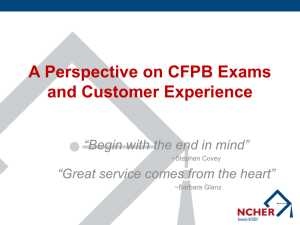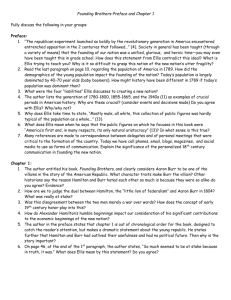PDF - Burr & Forman LLP
advertisement

JULY 2014 The Dodd-Frank Wall Street Reform and Consumer Protection Act was enacted as a measure to promote financial stability and protection for consumers through increased regulation of nearly every aspect of the consumer finance industry. In the years since its enactment, the Dodd-Frank Act has led to significant industry reforms and the promulgation of numerous new laws and regulations. In an effort to stay apprised of these significant industry changes, Burr & Forman’s Dodd-Frank Newsletter will serve as a periodic update of recent case law, news, and developments related to the Dodd-Frank Act. ---- RECENT CASES ---RESPA Roth v. CitiMortgage Inc., 13-3839-CV, 2014 WL 2853549 (2d Cir. June 24, 2014). In Roth v. CitiMortgage Inc., the Second Circuit held that although the mortgagor’s attorney had sent three letters to defendant CitiMortgage requesting various mortgage related information sent by her lawyer, the mortgagor’s RESPA claim was properly dismissed on the basis that her lawyer’s letters were not sent to CitiMortgage’s designated QWR address. Accordingly, the requests were not QWRs under RESPA and did not trigger CitiMortgage’s QWR duties under RESPA. In Roth, Defendant CitiMortgage Inc. serviced a second residential mortgage for Plaintiff Patricia Roth. Roth alleged, inter alia, that CitiMortgage’s responses to request for information about her mortgage violated RESPA. Since 2008, Roth had been in default and made no payments on the mortgage. During 2011, her attorney made the requests for information to CitiMortgage that were the subject of this suit. The district court dismissed Roth’s complaint for failure to state a claim and, on appeal, the Second Circuit affirmed. The Second Circuit recognized that in order to aid mortgage servicers with the task of providing consumers with timely information, RESPA’s implementing regulations allow (but do not require) servicers to establish a designated address for QWRs. According to the Court, “[t]he final rulemaking notice for the operative regulation, Regulation X, explained that if a servicer establishes a designated QWR address, then the borrower must deliver its request to that office in order for the inquiry to be a [QWR].” The Second Circuit expressly agreed with the Tenth Circuit in that “Regulation X’s grant of authority to servicers to designate an exclusive address is a permissible construction of RESPA.” Furthermore, the Court explained that even if an employee of CitiMortgage responded to the letters sent by Roth’s attorney, the letters were not QWRs. Additionally, Roth’s attorney argued that CitiMortgage’s QWR address failed to comply with the obligations of Regulation X in three ways. First, Roth argued that the change in the QWR address on the back of her mortgage statements and the fact that other departments apparently handled her lawyer’s letters suggested that CitiMortgage may not have had just one exclusive QWR address as required by Regulation X. The Court held that no authority prevents a servicer from changing its QWR address, and how Roth’s letters were handled was irrelevant if the letters were not QWRs. Second, Roth argued that the notice on the back of her mortgage statements was not “separately delivered.” The Court quickly dismissed this argument, holding that 24 C.F.R. § 3500.21(e) does not prohibit a notice of QWR address from being delivered along with other mortgage information. Finally, Roth argued that notice of CitiMortgage’s QWR address was insufficient because it was “buried in the fine print.” The Second Circuit disagreed, however, pointing to the fact that DODD-FRANK NEWS CitiMortgage’s notice “clearly specifies in capital letters, and in the same font size as the rest of the information on her mortgage statement, that “A QUALIFIED WRITTEN REQUEST REGARDING THE SERVICING OF YOUR LOAN MUST BE SENT TO THIS ADDRESS.” In sum, the Second Circuit concluded that Roth failed to allege that CitiMortgage did not properly designate a QWR address or that any of her lawyer’s letters were sent to the designated address. Because Roth’s letters were not QWRs, CitiMortgage’s RESPA duties were not triggered. Dodd-Frank amendments was January 10, 2014), the court held “that at this stage of the proceedings on a motion to dismiss, . . . the precise dates of the violations are best left for factual development through the discovery process.” Accordingly, the Court denied defendants’ motion to dismiss. FDCPA Crawford v. LVNV Funding, LLC, 13-12389, 2014 WL 3361226 (11th Cir. July 10, 2014) In Crawford v. LVNV Funding, LLC, the Eleventh Circuit became the first federal circuit court of appeals to hold that filing a proof of claim on a timebarred debt in a bankruptcy case violates the Fair Debt Collection Practices Act (“FDCPA”). The case arose when LVNV filed a proof of claim in Crawford’s bankruptcy case on a debt for which the statute of limitations had expired. In response, Crawford filed an adversary proceeding against LVNV, alleging that LVNV routinely filed proofs of claim on timebarred debts and that LVNV’s actions violated the FDCPA. Bryan v. Fed. Nat. Mortg. Ass’n, 2014 WL 2988097 (M.D. Fla. July 2, 2014) In Bryan v. Federal National Mortgage Association, plaintiffs alleged violations of RESPA and the applicable regulations set forth in 24 C.F.R. § 3500 and 12 C.F.R. § 1024.30, et seq. (Regulation X) against Seterus and Fannie Mae, respectively. Plaintiffs alleged that Fannie Mae was the “master servicer” of the note and mortgage, and Seterus was the “subservicer” of the note and mortgage. Specifically, plaintiffs alleged that defendants Seterus, and Fannie Mae by the failure of Seterus, failed to timely respond to plaintiffs’ requests to correct errors relating to allocation of payments, final balances, and avoidance of foreclosure, and failed to respond within ten business days to plaintiffs’ request to provide the identity of the owner or assignee of the loan. Defendants filed a motion to dismiss plaintiff’s Amended Complaint pursuant to Fed. R. Civ. P. 12(b)(6). The District Court denied defendants’ motion, however. The U.S. Bankruptcy Court for the Middle District of Alabama granted LVNV’s motion to dismiss the FDCPA claim, and the U.S. District Court affirmed. See Crawford v. LVNV Funding, LLC, No. 2:12-cv701-WKW, 2013 WL 1947616, at *1 (M.D. Ala. May 9, 2013). While noting that there was no binding authority on point, the district court noted that the “elephantine body of persuasive authority” weighed in favor of finding that filing a proof of claim in bankruptcy cannot give rise to an FDCPA claim. The district court explained that filing a proof of claim “does not amount to an effort to collect a debt,” but “even if it did, it is not the sort of abusive practice the FDCPA was enacted to prohibit.” Defendants contended that the alleged statutory violations did not occur because the applicable CFPB mortgage regulations, §§ 2605(k)(1)(C) and (D), did not become effective until January 10, 2014, which was after the conduct alleged in the amended complaint occurred. Plaintiffs argued, however, that the effective date of the CFPB’s mortgage regulations was January 21, 2013 based on the language of the Dodd-Frank Act itself and, therefore, were effective at the time of the alleged statutory violations. Although the Court cited Steele v. Quantum Servicing Corp., 2013 WL 3196544 (N.D. Tex. June 25, 2013) (holding the CFPB’s final rule’s effective date for the The Eleventh Circuit rejected both of the district court’s reasons for dismissing the FDCPA claim. The court stated that filing a proof of claim is an attempt to collect a debt covered by the FDCPA, which covers direct and indirect collection actions, including collection initiated through legal proceedings. The court noted that courts have “uniformly held” that the comparable act of suing on a time-barred debt violates the FDCPA. The court also pointed out that in Crawford’s case, neither Crawford nor the trustee 2 DODD-FRANK NEWS objected to LVNV’s time-barred claim, and money was actually paid out from the Chapter 13 estate for the debt. The plaintiff alleged that, despite providing his number on the credit application, he orally revoked his consent during a telephone call with Santander in December 2009. After conducting a review of corresponding entries in Santander’s activity notes (which contained a record of each call between the plaintiff and Santander), the Court determined that the plaintiff’s own self-serving testimony regarding his alleged oral revocation of consent was insufficient to survive summary judgment. In reaching its holding, the court emphasized the importance of statute of limitations provisions in the debt collection context. The court stated that “the limitations period provides a bright line for debt collectors and consumer debtors, signifying a time when the debtor’s right to be free of stale claims comes to prevail over a creditor’s right to legally enforce the debt.” The court noted that, with the passage of time, a debtor’s memory and records of the debt may diminish, “making it difficult for a consumer debtor to defend against the time-barred claim.” The Court also reviewed the defendant’s procedures for “verifying” a cellular telephone number with a borrower and determined that these verifications were evidence that the borrower did not orally revoke consent. Specifically, the Court stated: “Instead of revoking consent to be called on his cell phone number, Plaintiff repeatedly verified that the cell phone number was an acceptable contact number.” The Court also found it relevant that over 99% of the calls placed by Santander to the borrower went unanswered and that the borrower made nearly 50 calls to Santander from his cell phone. The court concluded that “a debt collector’s filing of a time-barred proof of claim creates the misleading impression to the debtor that the debt collector can legally enforce the debt.” The “least sophisticated consumer” may therefore fail to object to the claim, and, due to the Bankruptcy Code’s automatic allowance provision, the claim will be paid out of the debtor’s wages. For these reasons, the court found that filing a proof of claim on a time-barred debt was unfair, unconscionable, deceptive, and misleading, in violation of §§ 1692e and 1692f of the FDCPA. The Cherkaoui court also provided commentary on the automobile lending industry, stating that “Santander’s actions in relation to the Loan and Plaintiff were consistent with industry standards and practices under the circumstances” and that Santander had “demonstrated intent to provide Plaintiff the opportunity to become current and avoid repossession of [his vehicle].” Thus, the Court granted summary judgment in favor of Santander, finding that the plaintiff had provided Santander with “prior express consent” to call the cell phone at issue. The Eleventh Circuit declined to address whether the Bankruptcy Code preempts the application of the FDCPA in the bankruptcy context because that was not an issue before the court on appeal. TCPA Cherkaoui v. Santander Consumer USA, Inc., No. 4:13-cv-00467 (S.D. Tex. May 23, 2014) The Cherkaoui opinion provides helpful guidance for creditors/debt collectors that are seeking to contact a borrower. “Verifying” cell phone numbers during telephone calls was cited by the Court as strong evidence to rebut plaintiff’s self-serving testimony of oral revocation. Additionally, producing detailed activity notes related to telephone conversations with the borrower was also cited by the Court as additional evidence refuting claims of oral revocation. These procedures were enough for Santander to avoid a fact issue and disprove the undocumented allegations of the plaintiff. In Cherkaoui v. Santander Consumer USA, Inc., the U.S. District Court for the Southern District of Texas examined how a creditor may obtain “prior express consent” from a borrower and the level of evidence necessary for a borrower to survive summary judgment with claims of oral revocation of consent. The plaintiff in Cherkaoui obtained an automobile loan from the defendant, Santander Consumer USA, Inc. (“Santander”). On his credit application, the plaintiff provided his cellular telephone number. 3 DODD-FRANK NEWS In response, Crossman contended that the Court should apply a continuing violations theory to its claims and hold that each day that Asset failed to file a satisfaction of judgment damaged Crossman and constituted a new violation of the FDCPA and FCCPA. Alternatively, Crossman argued that the delayed discovery rule should apply to resuscitate his claims, or that the Court should hold that Asset’s recording of the satisfaction in 2013 operated to reset the statute of limitations periods. FCCPA & FDCPA Crossman v. Asset Acceptance, L.L.C., 5:14-CV115-OC-10, 2014 WL 2612031 (M.D. Fla. June 11, 2014) In Gregory Crossman v. Asset Acceptance, LLC, the court held that inaction cannot form the basis of a continuing violations theory under the FDCPA or FCCPA, the delayed discovery doctrine does not apply to same, and the recording of a satisfaction of judgment, albeit untimely, renders a § 701.04, Florida Statutes claim moot. Recognizing that the question of when a statute of limitations begins to run under the FDCPA and FCCPA when a debt collector fails to file a satisfaction of judgment was an issue of first impression in the entire federal court system, the court relied upon analogous decisions that held that the failure to act, i.e. inaction or an omission, cannot constitute the basis of a continuing violations theory. The court further noted that applying a continuing violations theory based solely on a failure to act would render the FDCPA and FCCPA’s statutes of limitations null as the limitations period could stretch on indefinitely. Here, because Crossman alleged no affirmative acts by Asset to collect on the judgment, the statute of limitations period began to ran on the first day following the sixty day period to satisfy the judgment under §701.04, and therefore expired prior to Crossman’s suit in late 2013. Next, the court pointed out that the delayed discovery rule does not apply to the FDCPA or FCCPA context, and the limitations period begins to run on the date of the alleged violation, not on the date when it was discovered. Finally, the court held that the recording of the satisfaction did not reset the limitations period because it was part of the 2005 litigation and was not a separate attempt to collect a debt. As for Crossman’s § 701.04 claim, the Court agreed with Asset that it had been rendered moot by the filing of the satisfaction and, nonetheless, was similarly subject to a statute of limitations period that had already expired. Plaintiff Gregory Crossman (“Crossman”) filed a two-count Complaint against defendant Asset Acceptance, LLC (“Asset”) alleging violations of the Fair Debt Collection Practices Act, 15 U.S.C. § 1692 et seq (“FDCPA”) and the Florida Consumer Collection Practices Act, §§ 559.55 – 559.785, Fla. Stat. (“FCCPA”). The claims were based on Asset’s alleged failure to record a satisfaction of a state court judgment entered in February 2007 after Crossman claimed that he paid the judgment in full in March 2007. Aside from Asset’s alleged failure to timely file a satisfaction of judgment, Crossman did not allege any other affirmative acts, or failures to act, that would run afoul of the FCCPA and FDCPA. Crossman claimed he had not discovered the judgment had not been satisfied until August 2013, but that he had been denied credit for various loans in the interim. After bringing this to Asset’s attention in October 2013, Asset promptly recorded a satisfaction of the judgment. After Asset moved to dismiss Crossman’s Complaint on statute of limitations grounds, Crossman filed an Amended Complaint adding a third count for violation of § 701.04, Fla. Stat., which requires a judgment creditor to record a satisfaction within sixty days of receipt of payment in full of same. Asset thereafter moved to dismiss the Amended Complaint arguing that all counts were barred by the statute of limitations, and that the 701.04 claim was moot as Asset had satisfied the judgment. Asset argued that any alleged violation of the FDCPA or FCCPA occurred in May 2007, the day after the sixty-day period under § 701.04 expired, and constituted the relevant starting point for the limitations period. Ultimately, the court held that the Crossman’s claims as pleaded were all barred by the statute of limitations and were, therefore, subject to dismissal. Because amendments would be futile with respect to the FCCPA and § 701.04 claims, the court dismissed them with prejudice. With respect to the FDCPA 4 DODD-FRANK NEWS claim, because Crossman had alleged that Asset had “continu[ed] to dun him,” in the Amended Complaint, the court granted Crossman leave to further amend his complaint to allege any such conduct. Nonetheless, the court cautioned Crossman to be wary of Fed. R. Civ. P. 11 in doing so. In Alaimo, Judge Scola was asked to reconsider his ruling in Signori based on new and novel arguments that Section 1641(g) of TILA, which mentions “new creditors,” means that liability for violations of 1641(f) (2) should extend to assignees. In the absence of such an interpretation, the plaintiff argued, assignees would free to retain the “sloppiest servicers” without concern of imputed liability. However, Judge Scola recognized that while such policy concerns may have merit, it was not for the court to deviate from the plain meaning of the statute’s limitation on assignee liability which evidenced Congress’s intent to limit assignee liability from violations, such as section 1641(f)(2) or section 226.36(c)(1)(iii) of Regulation Z. This opinion has even more wide ranging implications than Signori because it contains dicta which suggests that an assignee may not be held liable for violations of section 1641(g) in addition to reaffirming the court’s prior holding that no such liability can be had for violations of section 1641(f) (2) or section 226.36(c)(1)(iii) of Regulation Z. This holding constitutes an important development in the debt collection realm and sets a good precedent for analysis of the application of statutes of limitations to inaction or omissions on the part of debt collectors. TILA Alaimo v. HSBC Mortgage Services, Inc., 2014 WL 930787 (S.D. Fla. March 10, 2014) In Alaimo v. HSBC Mortgage Services, Inc., the Honorable Robert N. Scola extended his previous decision in Signori v. Fed. Nat’l Mortg. Assoc., 934 F.Supp.2d 1364, 1367 (S.D.Fla. 2013), holding that an assignee of a mortgage loan cannot be held liable for its servicer’s violation of section 1641(f)(2) of the Truth in Lending Act (“TILA”) or section 226.36(c)(1) (iii) or Regulation Z. ---- IN THE NEWS ---CFPB to Begin Collecting Complaints Regarding Prepaid Cards Section 1641(f)(2) requires a servicer to identify and provide certain contact information for the owner or master servicer of a borrower’s loan upon written request. Section 226.36(c)(1)(iii) of Regulation Z requires a pay-off statement be provided upon request. Plaintiff alleged that HSBC’s servicer had violated both provisions and that therefore HSBC should be held liable. It is worth noting that both parties agreed TILA and Regulation Z do not provide a provision for the servicer itself to be held liable. Both parties also agreed that HSBC was an assignee, and not the initial creditor, of the subject loan. The CFPB recently announced that it will begin collecting complaints related to prepaid cards. Complaints may include problems related to opening or closing an account, overdrafts, fraud, scams, marketing, and rewards features. To read more, visit: http://www.consumerfinance. gov/newsroom/cfpb-begins-accepting-consumercomplaints-on-prepaid-cards-and-additionalnonbank-products/ Previously, in Signori, Judge Scola had held that an assignee cannot be held liable for a servicer’s violation of Section 1641(f)(2) of TILA because Section 1641 expressly limits the liability of assignees to violations which are “apparent on the face” of “initial disclosures.” Since a violation of Section 1641(f) (2) can only occur post origination and in no case would be apparent on the face of initial disclosures, Judge Scola held liability could not be imputed to an assignee for a servicer’s violation of the statute, and dismissed an action brought on such claims. CFPB Proposes Letting Consumers Make Complaints Public On July 16, 2014, the CFPB proposed a new policy that would allow consumers to make their complaints about consumer financial products and services public. According to the CFPB, making complaints public would help the public to detect specific trends in the market and help to improve customer service. 5 DODD-FRANK NEWS To read the proposed policy, visit: http://files. consumerfinance.gov/f/201407_cfpb_proposedpolicy_consumer-complaint-database.pdf evading the CFPB’s regulations. In so doing, the CFPB will consider the following: whether the minicorrespondent still acts as a mortgage broker in some transactions; how many investors the minicorrespondent has; whether the mini-correspondent uses a bona fide warehouse line of credit; what changes the former broker made in staff and structure in order to become a mini-correspondent; and what entity is performing the majority of the mini-correspondent’s origination activities. CFPB Issues Final Interpretive Rule on Definition of “Assumption” Under Reg Z On July 11, 2014, the CFPB issued a final interpretive rule regarding the meaning of “assumption” and the application of the ability-to-repay rule to successors in interest. The ability-to-repay rule applies to any “covered transaction,” including certain “new transactions” that occur after consummation of a loan. One such “new transaction” is an “assumption.” To read the policy guidance, visit: http://files. consumerfinance.gov/f/201407_cfpb_guidance_ mini-correspondent-lenders.pdf Under the final interpretive rule, the CFPB clarified that a successor-in-interest’s agreement to be added or substituted as obligor on a consumer credit transaction securing the dwelling is not an “assumption” as defined by Regulation Z, and therefore, not subject to its disclosure requirements. Although a successor-in-interest’s agreement to take on a loan obligation is sometimes commonly referred to as an assumption, it is not an “assumption” for purposes of the ability-to-repay rule because it is not done in order to finance the acquisition or initial construction of a dwelling. Agencies Issue Guidance on HELOCs Nearing End-of-Draw Periods On July 1, 2014, several federal financial institution regulatory agencies issued guidance regarding HELOCs nearing their end-of-draw periods. A HELOC is a line of credit secured by a dwelling that generally provides for a draw period, during which a borrower has revolving access to unused funds, and a repayment period. Specifically, the guidance addresses principles that should govern management oversight of HELOCs ending their end-of-draw period. These principles include: prudent underwriting; compliance with existing pertinent guidance; sustainable modification terms; appropriate accounting of troubled debt restructurings; and appropriate segmentation and analysis of end-of-draw exposure. One effect of this guidance is to enable a borrower’s heir to be added to the mortgage without triggering the ability-to-repay rule. To read more, visit: http://files.consumerfinance. gov/f/201407_cfpb_bulletin_mortgage-lendingrules_successors.pdf To read more, visit: http://www.federalreserve.gov/ newsevents/press/bcreg/bcreg20140701a1.pdf CFPB Issues Policy Guidance Regarding “Mini-Correspondent Lenders” FFIEC Launches Cybersecurity Website On July 11, 2014, the CFPB issued policy guidance regarding supervisory and enforcement considerations regarding “mini-correspondent lenders.” According to the CFPB, many mortgage brokers have considered restructuring their business to become mini-correspondents that may not be subject to the Dodd-Frank Act. On June 24, 2014, the Federal Financial Institutions Examination Council (“FFIEC”) launched a website on cybersecurity. Part of an effort to raise awareness of cybersecurity risks at financial institutions, the website provides resources, such as webinars, that may help financial institutions address cybersecurity risks. The CFPB stated that it intends to closely monitor mini-correspondents to ensure that they are not 6 To view the website, visit: http://www.ffiec.gov/ cybersecurity.htm DODD-FRANK NEWS To read the report, visit: http://fhfaoig.gov/ Content/Files/EVL-2014-009.pdf OCC Issues Semiannual Risk Report The OCC recently issued the Spring 2014 edition of its semiannual risk report. In the report, the OCC noted that performance of federally chartered financial institutions improved in 2013 overall, with small banks lagging behind larger banks. Moreover, the OCC noted, consumer confidence improved, resulting in an increase in spending. CFPB Issues Final Rule Regarding Procedures for TROs On June 18, 2014, the CFPB issued a final rule adopting its September 2013 interim final rule regarding procedures for issuance of temporary cease-and-desist orders in adjudication proceedings brought under the Dodd-Frank Act. The final rule became effective July 18, 2014. Traditional risk metrics improved in 2013, with charge-offs and nonperforming assets dropping close to pre-recession levels. However, the OCC sees signs that credit risk is increasing, such as a decline in underwriting standards and increased layering of risk in the indirect auto loan market. To read the final rule, visit: http://www.gpo.gov/ fdsys/pkg/FR-2014-06-18/pdf/2014-14228.pdf For banks many banks, strategic risk is high for reasons such as expansion into new, less familiar products and reduction of overhead by outsourcing to third parties. Operational risk is also high for many banks due to changing business models and the proliferation of cybersecurity threats. Agencies Held Webinar on Community Reinvestment On July 17, 2014, several financial institution regulatory agencies held a webinar entitled “Interagency Questions and Answers Regarding Community Reinvestment.” The first in a series related to the new TILA-RESPA Integrated Disclosure rule, this webinar is now available online for public viewing. The OCC’s key priorities for the next 12 months include oversight of the 19 largest banks, operational risk To watch the webinar, visit: http://www. philadelphiafed.org/bank-resources/publications/ consumer-compliance-outlook/outlook-live/ To read the report, visit: http://www.occ. gov/publications/publications-by-type/otherpublications-reports/semiannual-risk-perspective/ semiannual-risk-perspective-spring-2014.pdf CFPB Issues Manual for Assisted Living Facilities FHFA to Consider Litigation Over ForcedPlaced Insurance The CFPB recently issued a manual entitled “Protecting residents from financial exploitation: A manual for assisted living and nursing facilities.” Designed to help managers and staff at assisted living and nursing facilities prevent financial exploitation of the elderly, the manual explains relevant laws, summarizes warning signs of exploitation, identifies common scams that target the elderly, and provides recommendations on facility policies to help prevent exploitation. On June 25, 2014, the Federal Housing Finance Agency (“FHFA”) issued a report entitled FHFA’s Oversight of the Enterprises’ Lender-Placed Insurance Costs. According to the FHFA’s inspector general, lenderplaced insurance (“LPI”) rates in several jurisdictions were excessive due to profit-sharing arrangements between servicers and insurers. As a result, Fannie and Freddie were overcharged $158 million in LPI premiums. Accordingly, the FHFA is considering litigation over these excessive LPI premiums. To read the manual, visit: http://files. consumerfinance.gov/f/201406_cfpb_guide_ protecting-residents-from-financial-exploitation.pdf 7 DODD-FRANK NEWS regulations until the end of this summer. This is in keeping with several other rulemaking delays recently announced. CFPB to Host Roundtable Discussion on Debt Collection On October 23, 2014, the CFPB will host a roundtable discussion entitled “Debt Collection & the Latino Community” to examine how debt collection issues affect Latino consumers, particularly those with limited proficiency in English. The roundtable is free and open to the public. To read the agency’s rulemaking agenda, visit: http://www.reginfo.gov/public/do/ eAgendaMain?operation=OPERATION_GET_ AGENCY_RULE_LIST&currentPub=true&agenc yCode=&showStage=active&agencyCd=3170&Im age58.x=58&Image58.y=5&Image58=Submit To learn more, visit: http://www.ftc.gov/newsevents/press-releases/2014/07/federal-tradecommission-consumer-financial-protectionbureau-co Agencies to Review Outdated Regulations Several financial institution regulatory agencies have requested public comment on bank regulations that are no longer necessary. Conducted under the Paperwork Reduction Act, the review will include rules on applications and reporting, powers and activities, and international operations. Comments are due September 2, 2014, and may address topics such as the purpose, effects, and burdens of the regulations. OCC Increases Assessments on Large Banks The OCC is adopting a final rule increasing assessments for national banks and federal savings associations with assets in excess of $40 billion. Increases depend on an institution’s assets, but will range between 0.32 percent and 14 percent. To read more, visit: https://s3.amazonaws.com/ public-inspection.federalregister.gov/2014-12741. pdf To read more, visit: https://www.federalregister. gov/articles/2014/07/09/2014-16017/assessmentof-fees Agencies Clarify Flood Insurance Coverage Requirements for Multi-Family Residences House Appropriations Committee Releases 2015 Financial Services Bill Several financial institution regulatory agencies recently released guidance regarding flood insurance coverage requirements for multi-family units classified as “other residential buildings” under the National Flood Insurance Program (“NFIP”). The maximum limit of coverage has been increased from $250,000 per building to $500,000 per building. On June 17, 2014, the House Appropriations Committee released the Financial Services and General Government Appropriations bill for fiscal year 2015. Among other things, the bill contains a provision that would change the CFPB’s funding source to the congressional appropriations process in fiscal year 2016 and require extensive reporting on the agency’s activities. These changes would increase transparency of the CFPB’s activities. The increase in the maximum amount of available insurance coverage may affect the minimum amount required for existing and future loans secured by “other residential buildings,” as the amount of insurance required, pursuant to the Biggert-Waters Act, is the lesser of the outstanding principal balance of the loan or the maximum amount available under the NFIP. To learn more, visit: http://appropriations. house.gov/news/documentsingle. aspx?DocumentID=384676 CFPB Delays Prepaid Card Rulemaking CFPB Director Richard Cordray recently announced that the CFPB will not release its new prepaid card To learn more, visit: http://www.fdic.gov/news/ news/financial/2014/fil14028a.pdf 8 DODD-FRANK NEWS - - ABOUT THE EDITORS - - David A. Elliott 1BSUOFS-JUJHBUJPO Ph: (205) 458-5324 n delliott@burr.com About David: David serves as chair of the firm’s Financial Services Litigation practice group, and has represented banks, finance companies and mortgage companies in all areas of statutory and common law litigation, as well as in asset based recovery actions. David also has extensive experience with enforcing arbitration agreements and with corresponding litigation before various arbitration associations. David was listed in the Best Lawyers in America for 2011 in the field of Commercial Litigation, and for 2012 in Business Litigation and Banking & Finance Litigation. David was also recognized by Alabama Super Lawyers for 2011 and 2012 in Business Litigation. David is admitted to practice in Alabama, Florida, and South Carolina. Kristen Peters Watson "TTPDJBUF-JUJHBUJPO Ph: (205) 458-5169 n kwatson@burr.com About Kristen: Kristen practices in the firm’s Financial Services Litigation practice group. She received her J.D., magna cum laude, from the Cumberland School of Law at Samford University, where she served as the Writing Editor of the Cumberland Law Review. In addition, she was a Judge Abraham Caruthers Teaching Fellow and a Dean’s Merit Scholar. Kristen received her B.A. from the University of Virginia. E. Jordan Teague "TTPDJBUF-JUJHBUJPO Ph: (205) 458-5488 n jteague@burr.com ABOUT JORDAN: Jordan practices in the firm’s Financial Services Litigation practice group. She received her J.D. from Vanderbilt University, where she was the Senior Technology Editor of the Vanderbilt Journal of Entertainment and Technology Law. Jordan received her B.A., magna cum laude, in Mathematics-Economics from Furman University. Seth Muse "TTPDJBUF-JUJHBUJPO Ph: (205) 458-5395 n smuse@burr.com ABOUT SETH: Seth practices in the Financial Services Litigation practice group. Seth received his J.D. from Southern Methodist University Dedman School of Law in Dallas, Texas. While in law school, Seth was the 2012 Negotiations Competition champion, a semifinalist in the 2011 San Diego Defense Lawyer’s Mock Trial Competition, best speaker in the 2011 Jackson Walker Competition and a semifinalist in the 1L Closing Argument Competition in 2010. Seth received his B.A.s from Flagler College as well as the Samuel M. Proctor Memorial Scholarship. No representation is made that the quality of services to be performed is greater than the quality of legal services performed by other lawyers. 9 Burr & Forman’s Financial Services Litigation Team NICK AGNELLO Ft. Lauderdale (954) 414-6200 nagnello@burr.com BRIAN BALOGH Birmingham (205) 458-5469 bbalogh@burr.com GENNIFER BRIDGES Orlando (407) 540-6687 gbridges@burr.com STEPHEN BUMGARNER Birmingham (205) 458-5355 sbumgarner@burr.com RACHEL CASH Birmingham (205) 458-5483 rcash@burr.com JOHN CHILES Ft. Lauderdale (954) 414-6200 jchiles@burr.com ED COTTER Birmingham (205) 458-5130 ecotter@burr.com MATT DEVINE Orlando (407) 540-6679 mdevine@burr.com LINDSAY DYKSTRA Orlando (407) 540-6614 ldykstra@burr.com LAUREN EINHORN Ft. Lauderdale (954) 414-6220 leinhorn@burr.com DAVID ELLIOT Birmingham (205) 458-5324 delliott@burr.com RACHEL FRIEDMAN Birmingham (205) 458-5267 rfriedman@burr.com ALEX HADDAD Tampa (813) 367-5725 ahaddad@burr.com JOHN HARRELSON Birmingham (205) 458-5463 jharrelson@burr.com RYAN HEBSON Birmingham (205) 458-5144 rhebson@burr.com JACKIE HUTZELL Birmingham (205) 458-5181 jhutzell@burr.com TREY JORDAN Jackson (601) 709-3449 tjordan@burr.com BEN KATZ Ft. Lauderdale (954) 414-6209 bkatz@burr.com JOHN MICHAEL KEARNS Atlanta (404) 685-4251 jkearns@burr.com RICHARD KELLER Birmingham (205) 458-5323 rkeller@burr.com ALAN LEETH Birmingham (205) 458-5499 aleeth@burr.com REID MANLEY Birmingham (205) 458-5439 rmanley@burr.com ZACHARY MILLER Birmingham (205) 458-5250 zmiller@burr.com MATT MITCHELL Birmingham (205) 458-5317 mmitchell@burr.com SETH MUSE Birmingham (205) 458-5395 smuse@burr.com JOHN NEFFLEN Nashville (615) 724-3219 jnefflen@burr.com COURTNEY OAKES Ft. Lauderdale (954) 414-6213 coakes@burr.com ERIC PENDERGRAFT Tampa (954) 414-6214 ependergraft@burr.com JOSHUA PLAGER Ft. Lauderdale (954) 414-6218 jplager@burr.com JACQUELINE SIMMSPETREDIS FRANK SPRINGFIELD Tampa (813) 367-5751 jsimms-petredis@burr.com Birmingham (205) 458-5187 fspringfield@burr.com MEGAN STEPHENS Birmingham (205) 458-5289 mstephens@burr.com BRENDAN SWEENEY Ft. Lauderdale (954) 414-6210 bsweeney@burr.com JONATHAN SYKES Orlando (407) 540-6636 jsykes@burr.com LAURA TANNER Tampa (813) 367-5758 ltanner@burr.com JORDAN TEAGUE Birmingham (205) 458-5488 jteague@burr.com JOSHUA THREADCRAFT Birmingham (205) 458-5132 jthreadcraft@burr.com RIK TOZZI Birmingham (205) 458-5152 rtozzi@burr.com BRAD VANCE Jackson (601) 709-3456 bvance@burr.com KRISTEN WATSON Birmingham (205) 458-5169 kwatson@burr.com AMANDA WILSON Atlanta (404) 685-4273 awilson@burr.com JENNIFER ZIEMANN Atlanta (404) 685-4336 jziemann@burr.com ATLANTA 171 Seventeenth Street, NW Suite 1100 Atlanta, GA 30363 (404) 815-3000 BIRMINGHAM 420 North 20th Street Suite 3400, Wachovia Tower Birmingham, AL 35203 (205) 251-3000 FT. LAUDERDALE Las Olas Centre I 450 East Las Olas Boulevard Suite 700 Ft. Lauderdale, FL 33301 (954) 414-6200 JACKSON The Heritage Building 401 East Capitol Street Suite 100 Jackson, MS 39201 (601) 355-3434 MOBILE RSA Tower 11 North Water Street Suite 22200 Mobile, AL 36602 (251) 344-5151 MONTGOMERY 201 Monroe Street Suite 1950, RSA Tower Montgomery, AL 36104 (334) 241-7000 NASHVILLE 700 Two American Center 3102 West End Avenue Nashville, TN 37203 (615) 724-3200 ORLANDO 200 S. Orange Avenue Suite 800 Orlando, FL 32801 (407) 540-6600 TAMPA One Tampa City Center Suite 3200 201 North Franklin Street Tampa, FL 33602 (813) 221-2626 This update contains only a summary of the subject matter discussed and does not constitute and should not be treated as legal advice regarding the topics discussed therein. The topics discussed involve complex legal issues and before applying anything contained herein to a particular situation, you should contact an attorney and he or she will be able to advise you in the context of your specific circumstances. Alabama State Bar rules require the inclusion of the following: No representation is made about the quality of the legal services to be performed or the expertise of the lawyer performing such services. In addition, the Rules of Professional Conduct in the various states in which our offices are located require the following language: THIS IS AN ADVERTISEMENT. FREE BACKGROUND INFORMATION AVAILABLE UPON REQUEST.








